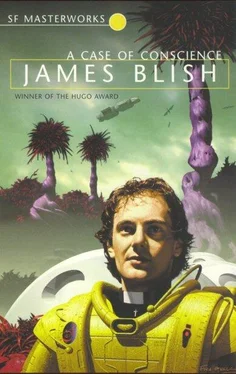“You can’t get there any too soon for me,” Cleaver said morosely. “How a man can stand fifty light-years from home in deep space and talk such parochial nonsense is beyond my comprehension.”
“Parochial?” Ruiz-Sanchez said, more angrily than he had intended. “Do you mean that what we think true on Earth is automatically made suspect just by the fact of its removal into deep space? I beg to remind you, Paul, that quantum mechanics seem to hold good on Lithia, and that you see nothing parochial about behaving as if it does. If I believe in Peru that God created and still rules the universe, I see nothing parochial in my continuing to believe it on Lithia. You brought your parish with you; so did I. This has been willed where what is willed must be.” As always, the great phrase shook him to the heart. But it was obvious that it meant nothing to anyone else in the room; were such men hopeless? No, no. That Gate could never slam behind them while they lived, no matter how the hornets buzzed for them behind the deviceless banner. Hope was with them yet.
“A while back I thought I had been provided an escape hatch, incidentally,” he said. “Chtexa told me that the Lithians would like to modify the growth of their population, and he implied that they would welcome some form of birth control. But, as it turns out, birth control in the sense that the Church interdicts it is impossible to Lithia, and what Chtexa had in mind was obviously some form of fertility control, a proposition to which the Church gave its qualified assent many decades ago. So there I was, even on this small point forced again to realize that we had found on Lithia the most colossal rebuke to our aspirations that we had ever encountered: a people that seems to live with ease the kind of life which we associate with saints alone.
“Bear in mind that a Muslim who visited Lithia would find no such thing; though he would find a form of polygamy here, its purposes and methods would revolt him. Neither would a Taoist. Neither would a Zoroastrian, presuming that there were still such, or a classical Greek. But for the four of us—and I include you, Paul, for despite your tricks and your agnosticism you still subscribe to the Christian ethical doctrines enough to be put on the defensive when you flout them—what we four have here on Lithia is a coincidence which beggars description. It is more than an astronomical coincidence—that tired old metaphor for numbers that don’t seem very large any more—it is a transfinite coincidence. It would take the shade of Cantor himself to do justice to the odds against it.”
“Wait a minute,” Agronski said. “Holy smoke. I don’t know any anthropology, Mike, I’m lost here. I was with the Father up to the part about the mixed forest, but I don’t have any standards to judge the rest. Is it so, what he says?”
“Yes, I think it’s so,” Michelis said slowly. “But there could be differences of opinion as to what it means, if anything. Ramon, go on.”
“I will. There’s still a good deal more to say. I’m still describing the planet, and more particularly the Lithians. The Lithians take a lot of explaining. What I’ve said about them thus far states only the most obvious fact. I could go on to point out many more, equally obvious facts. They have no nations and no regional rivalries, yet if you look at the map of Lithia—all those small continents and archipelagoes separated by thousands of miles of seas—you’ll see every reason why they should have developed such rivalries. They have emotions and passions, but are never moved by them to irrational acts. They have only one language, and have never had more than this same one—which again should have been made impossible by the geography of Lithia. They exist in complete harmony with everything, large and small, that they find in their world. In short, they’re a people that couldn’t exist—and yet does.
“Mike, I’ll go beyond your view to say that the Lithians are the most perfect example of how human beings ought to behave that we’re ever likely to find, for the very simple reason that they behave now the way human beings once once behaved before we fell in our own Garden I’d go even farther: as an example, the Lithians are useless to us, because until the coming of the Kingdom of God no substantial number of human beings will ever be able to imitate Lithian conduct. Human beings seem to have built-in imperfections that the Lithians lack—original sin, if you like—so that after thousands of years of trying, we are farther away than ever from our original emblems of conduct, while the Lithians have never departed from theirs.
“And don’t allow yourselves to forget for an instant that these emblems of conduct are the same on both planets. That couldn’t ever have happened, either—but it did.
“I’m now going to adduce another interesting fact about Lithian civilization. It is a fact, whatever you may think of its merits as evidence. It is this: that your Lithian is a creature of logic. Unlike Earthmen of all stripes, he has no gods, no myths, no legends. He has no belief in the supernatural—or, as we’re calling it in our barbarous jargon these days, the ‘paranormal.’ He has no traditions. He has no tabus. He has no faiths, except for an impersonal belief that he and his lot are indefinitely improvable. He is as rational as a machine. Indeed, the only way in which we can distinguish the Lithian from an organic computer is his possession and use of a moral code.
“And that, I beg you to observe, is completely irrational. It is based upon a set of axioms, a set of propositions which were ‘given’ from the beginning—though your Lithian sees no need to postulate any Giver. The Lithian, for instance Chtexa, believes in the sanctity of the individual. Why? Not by reason, surely, for there is no way to reason to that proposition. It is an axiom. Or: Chtexa believes in the right of juridical defense, in the equality of all before the code. Why? It’s possible to behave rationally from the proposition, but it’s impossible to reason one’s way to it. It’s given. If you assume that the responsibility to the code varies with the individual’s age, or with what family he happens to belong to, logical behavior can follow from one of these assumptions, but there again One can’t arrive at the principle by reason alone.
“One begins with belief: ‘I think that all people ought to be equal before the law.’ That is a statement of faith, nothing more. Yet Lithian civilization is so set up as to suggest that one can arrive at such basic axioms of Christianity, and of Western civilization on Earth as a whole, by reason alone—in the plain face of the fact that one cannot. One rationalist’s axiom is another one’s madness.”
“Those are axioms,” Cleaver growled. “You don’t arrive at them by faith, either. You don’t arrive at them at all. They’re self-evident, that’s the definition of an axiom.”
“It was until the physicists kicked that definition to pieces,” Ruiz-Sanchez said, with a certain grim relish. “There’s the axiom that only one parallel can be drawn to a given line. It may be self-evident, but it’s also untrue, isn’t it? And it’s self-evident that matter is solid. Go on, Paul, you’re a physicist yourself. Kick a stone for me, and say, “Thus I refute Bishop Berkeley.’”
“It’s peculiar,” Michelis said in a low voice, “that Lithian culture should be so axiom-ridden, without the Lithians being aware of it. I hadn’t formulated it in quite these terms before, Paul, but I’ve been disturbed myself at the bottomless assumptions that lie behind Lithian reasoning—all utterly unprobed, although in other respects the Lithians are very subtle. Look at what they’ve done in solid-state chemistry, for instance. It’s a structure of the purest kind of reason, and yet when you get down to its fundamental assumptions you discover the axiom: ‘Matter is real.’ How can they know that? How did logic lead them to it? It’s a very shaky notion, in my opinion. If I say that the atom is just a-hole-inside-a-hole-through-a-hole, how can they controvert me?”
Читать дальше











